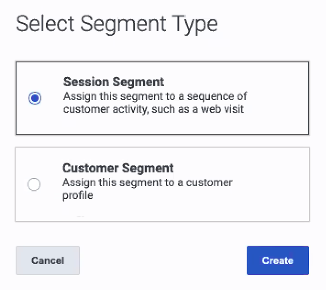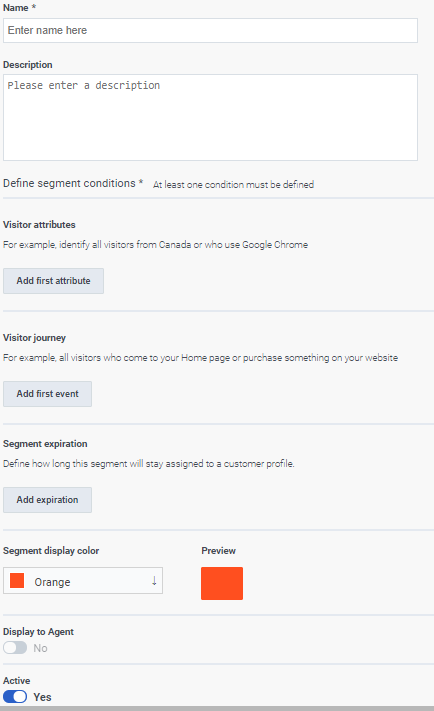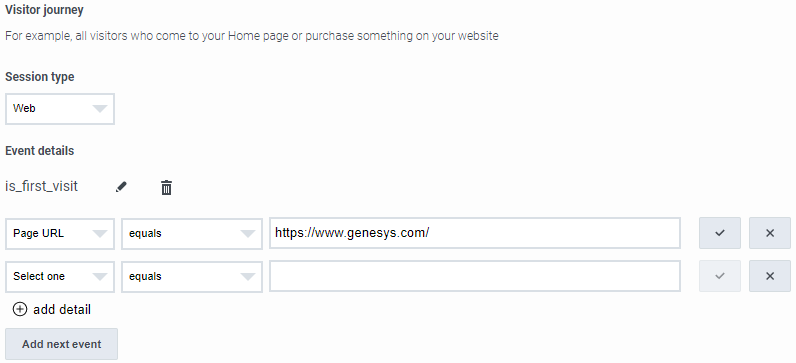Difference between revisions of "ATC/Current/AdminGuide/Manage segments"
(Published) |
(Published) |
||
| Line 2: | Line 2: | ||
|Standalone=No | |Standalone=No | ||
|DisplayName=Manage segments | |DisplayName=Manage segments | ||
| − | |Context=Learn how to manage segments that identify and classify visitors based on their shared behavior and characteristics. | + | |Context=Learn how to manage segments that identify and classify visitors based on their shared behavior and characteristics.<br /> |
| + | {{BarbDeprecation|Link={{Link-Standalone|topic=ATC/Deprecation-Select_trait_mapper_traits}}}} | ||
| + | |Dimension=Segments | ||
|ComingSoon=No | |ComingSoon=No | ||
|Platform=GenesysEngage-onpremises, PureConnect, GenesysCloud | |Platform=GenesysEngage-onpremises, PureConnect, GenesysCloud | ||
| Line 23: | Line 25: | ||
|Media=Image | |Media=Image | ||
|image=SegmentCreate.png | |image=SegmentCreate.png | ||
| − | |structuredtext= | + | |structuredtext=To simplify the process of creating a segment, {{Link-SomewhereInThisVersion|manual=AdminGuide|topic=Segments#DuplicateSegment|display text=duplicate an existing segment.}}<br /> |
| + | {{NoteFormat| | ||
*If you are creating a session segment, you must specify at least one condition. | *If you are creating a session segment, you must specify at least one condition. | ||
*If you specify multiple conditions, the segment matches a visitor only when all the conditions match. | *If you specify multiple conditions, the segment matches a visitor only when all the conditions match. | ||
| Line 68: | Line 71: | ||
|Status=No | |Status=No | ||
}}{{Section | }}{{Section | ||
| − | |sectionHeading=AI-23 | + | |sectionHeading=AI-23 Add to section above |
|alignment=Vertical | |alignment=Vertical | ||
| − | |structuredtext= | + | |structuredtext=For more information about the number of segments that you can create for your organization, see Limits for {{MintyDocsProduct}} objects. |
| + | |||
| + | (Adding the link to the Object_limits article causes the article not to save. So, add it at publication time.) | ||
|Status=Yes | |Status=Yes | ||
}}{{Section | }}{{Section | ||
| Line 94: | Line 99: | ||
*[[Draft:ATC/Current/AdminGuide/Custom sessions|Custom sessions and custom events]] | *[[Draft:ATC/Current/AdminGuide/Custom sessions|Custom sessions and custom events]] | ||
|structuredtextwide={{SessionTypes}} | |structuredtextwide={{SessionTypes}} | ||
| − | |||
| − | |||
|Status=No | |Status=No | ||
}}{{Section | }}{{Section | ||
Revision as of 18:34, May 18, 2021
Contents
Learn how to manage segments that identify and classify visitors based on their shared behavior and characteristics.
Prerequisites
- Configure the following permissions in Genesys Cloud:
- Journey > Segment >Add , Delete, Edit, View
Select segment type
Create or edit a segment
To simplify the process of creating a segment, duplicate an existing segment.
- If you are creating a session segment, you must specify at least one condition.
- If you specify multiple conditions, the segment matches a visitor only when all the conditions match.
| Entity | Description |
|---|---|
| Name | Descriptive name of the segment. |
| Description | (Optional) Description of the segment. |
| Visitor attributes | Attributes that identify visitors based on characteristics such as location, browser, or device type. |
| Visitor journey | Attributes that identify visitors based on their shared behaviors. For example, completing a form or going to a specific webpage. |
| Session type | Session type for grouping data about a visitor's activities. |
| Segment expiration | For customer segments only!
Number of days that the segment remains assigned to a customer profile before the segment assignment expires. The minimum number of days that you can assign is 2 and the maximum number of days is 180. Segment expiration only applies to segments that you assign after you set the expiration days. Segment expiration does not apply to segments that you assigned before setting the expiration days. |
| Segment display color | Background color to use when displaying the segment name (for example, in Live Now and the Action Map Report). |
| Display to Agent | For session segments only!
This feature isn't available for customer segments. Session segments display to agents by default. Agents can see when Genesys Predictive Engagement matches visitors to a segment. However, not all segments are relevant to all agents. For example, a segment that matches based on a visitor's search for a specific product that an agent does not support. Or, a segment that matches based on sensitive personal data or data that an agent should not see because of privacy restrictions. To prevent agents from seeing a segment, slide the toggle to No.Important Segments that don't display to agents appear in Live Now and reports. The segments can also trigger action maps. These segments remain in a customer's record. |
| Active | Segments are active by default. When a segment is active, it is ready to match visitors on your web site.
To deactivate a segment temporarily from matching, slide the toggle to No. To remove a segment permanently, delete it. |
Visitor attributes
For more information about visitor attribute operators, see operators.
For more information about visitor attributes that enable UTM-tracking of campaign-specific activities, see Campaign attributes.| Attribute name | Description | Examples |
|---|---|---|
| Device category | Category of device that the visitor is using. | desktop
mobile other tablet |
| Device type | Type of device that the visitor is using. | Apple
Archos Asus HTC Huawei Nokia Samsung SUN Microsystems Unknown |
| OS family | Operating system family that the visitor is using. | Android
Chrome OS Firefox OS iOS Linux Mac OS Tizen Unknown Windows 9x Windows CE Windows NT Windows Phone Ubuntu |
| Browser family | Browser family that the visitor is using, including all versions of the browser within that family. | Chrome
Firefox HTC_HD2_T8585 Opera IE Mobile Internet Explorer Opera Safari SamsungBrowser Viera |
| Browser version | Major version of the browser that the visitor is using. | 55 |
| Campaign source* | A search engine, newsletter, or other source (UTM parameter). | direct
adWords |
| Campaign medium* | Medium such as email or cost-per-click (UTM parameter). | direct
organicsocialppcwebsite-ppc |
| Campaign name* | Specific product promotion or strategic campaign (UTM parameter). | test campaign
Summer19 |
| Campaign term* | Keywords for this ad (UTM parameter). | device
trialsubscription |
| Campaign content* | Ads or links that point to the same URL (UTM parameter). | |
| Campaign Click ID* | Unique number that generates when a potential customer clicks an affiliate link (UTM parameter). | CjwKCAiA1ZDiBRAXEiwAIWyNC2J6QZBJYwXHJPsZ
khECGKaZ7nRjmNEQzmn1Hqh8Labvn3FQ-Tn1pRoCEDYQAvD_BwE |
| Campaign network* | Ad network to which the click ID belongs (UTM parameter). | search network
display network |
| Country | Visitor's country. | United States |
| City | Visitor's city or town. | Chicago |
| Region | Visitor's region.
To track by U.S. states, supply the 2-digit state code (all caps). |
Midwest
IN |
| Post code | Visitor's postal code. | 60610 |
| CCA2 code | Two-letter country code. | US |
| Browser language code | Language to which the visitor's browser is set. | en-gb |
| Organization name | Organization name derived from the IP. | alto-universal.com |
| Referral URL | Referrer page URL. | https://alto-universal.com/auto#quote-details |
| Referral hostname | Referrer host or hostname. | alto-universal.com |
Visitor journey session types
For more information about each type of session, see:
| Session type | Examples | Example events in the session |
|---|---|---|
| Web | A user goes to your website and completes a form to place an online order. |
|
| Custom | An order ships. |
|
Visitor journey attributes
When you define a condition that includes a visitor journey attribute, Genesys Predictive Engagement matches visitors based on whether they take the action. For example, visitors who complete a form, go to a specific webpage, or add a product to their shopping cart but don't complete the purchase.
For more information about visitor journey attribute operators, see operators.- The system doesn't validate free form text. If you misspell a value, the segment doesn't trigger. For example, typing "ACB Retailer" when the page title is "ABC Retailer".
- When specifying time for a custom web event, include milliseconds.
- When specifying numeric values for a custom web event, only numeric relational operators are available. For example, say you have a custom event called "CartValue" and you want to target all customers who have a cart value of $100 or more. You would select the "greater than or equal to" operator and type 100 in the value box. Note: You can include decimal points but not the currency symbol.
| Attribute name | Description | Example |
| autotrackClick | To track when and where a visitor clicks on a webpage. For more information, see autotrackClick. | Clicks 'More' button. |
| Custom attribute | Allows you to identify groups of visitors based on characteristics and behaviors that are specific to your business. | packageDeliveryStatus |
| Event name | Represents actions that occur on your website. For example, object clicked (such as a button, link, or menu option), error generated, inactivity detected, URL changed, or scroll detected.
For more information about configuring events, see About modules. |
The recommended format is object_action.
|
| form:track | To track the value of webpage form submissions. For more information, see forms:track. | sign-up-form |
| Page URL | URL of the page. Full protocol required. | https://www.genesys.com/?s&q=predictive%20engagement |
| Page title | Meta title of the page (not the heading on the page). | Contact Us |
| Page hostname | Host name of the page's URL. | app.genesys.cloud |
| Page domain | Domain of the page's URL. | app.genesys.cloud |
| Page fragment | Fragment of the page's URL, sometimes called a named anchor. It usually appears at the end of a URL and begins with a hash (#) character followed by the identifier. | #/journey/segment/create |
| Page keywords | Keywords from the HTML<meta>tag of the page. | contact |
| Page pathname | Path name of the page. | /journey/admin/ |
| Search query | Represents the keywords in a visitor's search query. | test |
| URL query string | Query string that passes to the page in the current event. | q=test |





